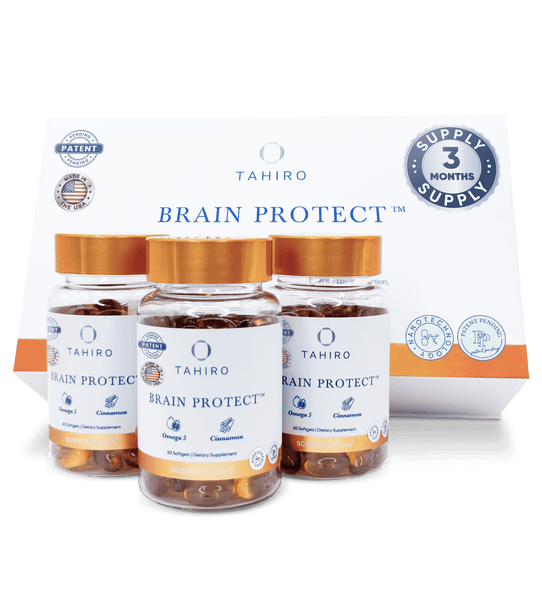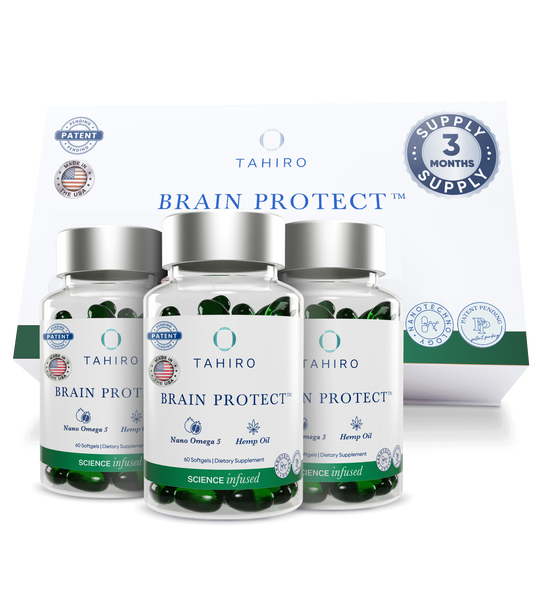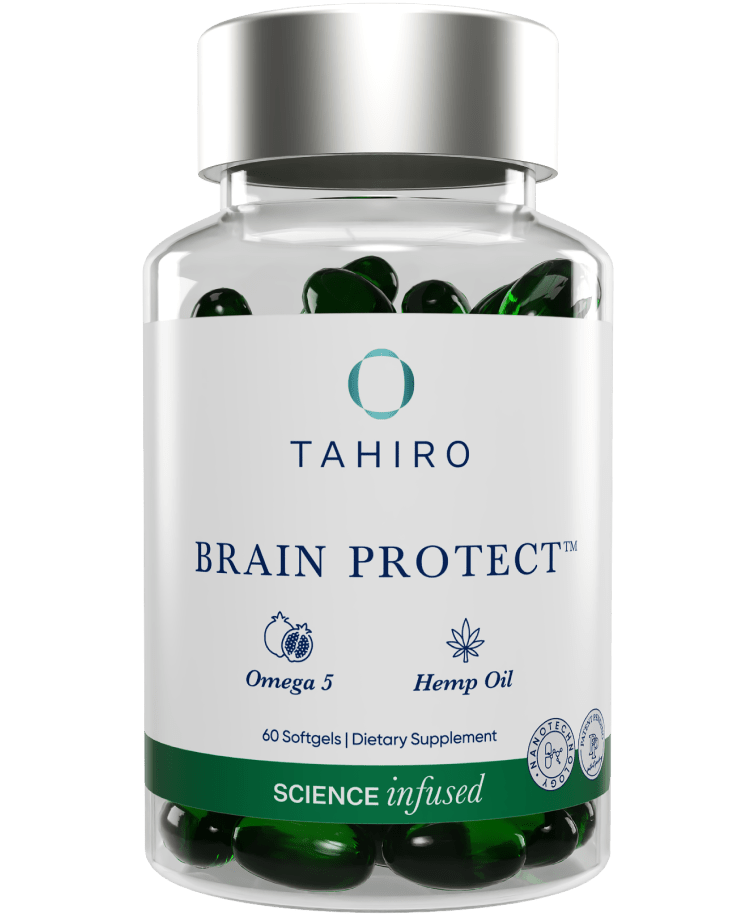Pomegranates offer a plethora of benefits, ranging from heart health and hormonal balance to skin beauty and fertility support. Including this superfood in your diet can be a delicious and nutritious way to boost your overall health.
Whether you enjoy them fresh, as juice, or as a topping for yogurt and salads, pomegranates are a versatile and valuable addition to anyone’s diet.
Now, if you are looking for a consistent daily dose of pomegranates, you may have considered taking a pomegranate supplement, such as Tahiro’s Brain Protect™. It contains high levels of punicic acid, a compound found in pomegranate seed oil that has been found to improve cognitive function and reduce the risk of dementia. While it’s difficult to eat enough pomegranate seeds daily to get a meaningful amount of punicic acid, this supplement makes it easy to take advantage of this beneficial substance.
Pomegranate Concentrate vs. Juice
Before we discuss the health benefits of pomegranate extract and juice, it’s important to understand where each comes from.
Pomegranate juice is pressed from whole pomegranates. Pomegranate concentrate is a form of pomegranate juice with some of the water removed, to make it more concentrated. Pomegranate extract (1) is a dietary supplement in powder or pill form. It may contain dried and powdered pomegranate juice, or it may contain pomegranate seed oil, which is pressed specifically from the seeds of the pomegranate.
Now, it’s important to understand that there is a difference between pomegranate concentrate, pomegranate extract, and pomegranate juice. So, what is the difference?
What Is The Difference Between Pomegranate Concentrate And Juice?
The main difference between pomegranate concentrate and juice is that pomegranate concentrate has a higher content of nutrients and compounds than juice. In other words, you get more out of the liquid in a smaller volume.
Pomegranate Extract Health Benefits
For some people, taking a daily supplement of pomegranate extract is easier than eating or drinking a large volume of pomegranate fruit, juice, or concentrate daily. Here are some of the potential health benefits of pomegranate extract which have been found in research.
-
Rich in antioxidants. Since pomegranate extract contains the skin, it is high in antioxidants called polyphenols (2). As a result, it can help decrease inflammation and the risk of chronic illnesses.
-
Improved brain function. Animal studies (3) have shown that pomegranate supplements can help improve memory and learning skills and decrease anxiety. It may also help reduce the risk of age-related diseases, such as Alzheimer’s disease.
-
Improved heart health. Evidence suggests that pomegranate extract can help regulate blood glucose levels and improve lipid profile (4), meaning it can help promote better heart health.
-
Antibacterial properties. While more research is needed to determine the antibacterial properties (5) of pomegranate extract, current research seems promising. It may provide an extra layer of protection against infections and support healthy immune function.
Pomegranate Juice Health Benefits
Here are some of the potential health benefits of pomegranate juice.
-
High in antioxidants. Pomegranate juice contains high levels of antioxidants from the family of ellagitannins (6). They can help reduce inflammation and enhance immune function.
-
Improved digestion. Some studies (7) indicate that pomegranate juice may help improve symptoms of inflammatory bowel disease (IBD). However, if you are experiencing diarrhea, it’s best to avoid taking pomegranate juice due to its high sugar content.
-
Improved fertility. Thanks to its high antioxidant content, pomegranate juice may help improve the motility and quality of the sperm (8), improving fertility.
Does Pomegranate Extract Have More Benefits Than The Juice?
There doesn’t seem to be enough evidence to say definitively whether pomegranate extract has more benefits than pomegranate juice. There have only been a few studies directly comparing these two options. In most cases, pomegranate juice and extract provide the same health benefits. (6) Some studies have shown that pomegranate juice may actually be better at helping to control blood sugar than pomegranate extract (9), although it’s unclear exactly why this would be the case.
It’s also important to note that not all pomegranate extracts are the same. In many cases, “pomegranate extract” refers to pomegranate juice that has been dried and encapsulated. (6) By contrast, “pomegranate seed oil” is pressed specifically from the seeds of the pomegranate (rather than other parts of the fruit), and is particularly rich in fatty acids such as punicic acid.
In the end, both options are likely to provide similar health benefits, including reduced inflammation, improved cognitive function and heart health, and enhanced immune function.
If you choose pomegranate juice, be careful about which type you buy. Some commercial pomegranate juices are high in sugars, making them a poor choice. Make sure you check the nutritional label before purchasing and don’t choose pomegranate juice that has added sugars or other ingredients.







